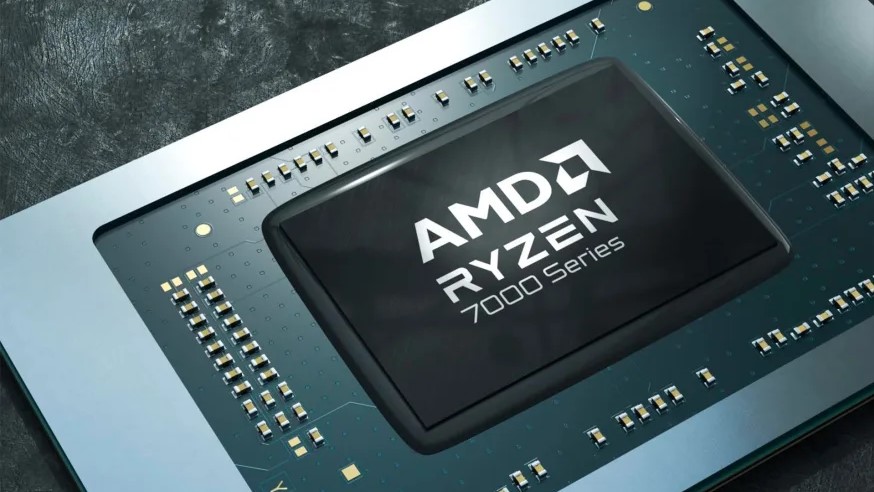AMD promises its new laptop chips will crush the Apple M2 - and it’s got receipts
Like a phoenix from the ashes

Sign up for breaking news, reviews, opinion, top tech deals, and more.
You are now subscribed
Your newsletter sign-up was successful
Well folks, they’re finally here: after a spate of delays, AMD has unveiled its shiny new laptop processors, the Ryzen 7040U series. Designed to power a new wave of next-generation ultra-thin devices, these chips could take laptop performance to a whole new level - and AMD is clearly feeling confident about it.
Why do I say this? Well, Team Red isn’t messing about with its promotional material: we’ve got direct comparisons not just to Intel’s competing 13th-gen CPUs, but also Apple’s powerhouse M2 chip.
AMD doesn’t beat around the bush; the Ryzen 7 7840U, the initial flagship APU of the new series, apparently offers 9% better 3D rendering performance, 14% better responsiveness, and a whopping 72% better multiprocessing performance than the standard M2. That’s the one you’ll find in the latest MacBook Air - we can probably expect the M2 Pro and M2 Max chips found in this year’s MacBook Pro.
Packing up to 8 Zen 4 cores and AMD’s Radeon 780M integrated graphics as well as XDNA AI architecture, these new chips - previously codenamed ‘Phoenix’ - are purpose-built for the best ultrabooks around. With that in mind, they use impressively tiny amounts of power; even the flagship 7840U uses just 15W of power at base, almost half that of the base TDP of the competing Intel Core i7-1360P.
The RDNA 3 iGPUs are hugely improved here too, apparently crushing Intel’s Iris Xe integrated graphics, with performance as much as 139% better than the i7-1360P’s graphics. That’s at 1080p Low settings, but still impressive for a system without a dedicated GPU!
There will be four new chips: the aforementioned Ryzen 7 7840U, the midrange Ryzen 5 7640U and 7540U, and the affordable Ryzen 3 7440U. No Ryzen 9 chip just yet - we don't know if that's not planned, or if AMD is holding it in reserve for a later release.
The future of gaming laptops?
I’ve already noted that AMD’s new chips could be a huge blow to Nvidia and the discrete graphics card market as a whole, and while the performance figures shown here don’t exactly blow me away (showing percentage comparisons rather than real-world framerates is telling), it’s still impressive.
Sign up for breaking news, reviews, opinion, top tech deals, and more.
AMD is really committing to its integrated graphics, and I couldn’t be happier about that: I’ve long believed that discrete graphics cards should be left in the past, and processors like this are a step in the right direction.
After all, AMD already makes the chips that power our modern consoles, from the Steam Deck to the PS5. More recently, Team Red has pushed its new Z1-series APUs, which will be powering the intriguing new PC gaming handheld from Asus - the ROG Ally.
Low-power processors with impressive integrated graphics could prove to be the future of gaming laptops - if you’ve ever used a gaming laptop, you’ll probably know that most of them are big, bulky, heavy machines. That’s because they need to pack in a whole graphics card; and not just that, but a cooling solution and a large battery to support it.
Cut out the dedicated GPU, and you end up with laptops like the gorgeous Dell XPS 13: sleek, lightweight, and without the jet-engine fan whine of a beefy gaming rig. This is the future, folks! I’m tired of lugging around my chunky old Razer Blade! I want something slim and light, dammit! Let’s go, AMD!

Christian is TechRadar’s UK-based Computing Editor. He came to us from Maximum PC magazine, where he fell in love with computer hardware and building PCs. He was a regular fixture amongst our freelance review team before making the jump to TechRadar, and can usually be found drooling over the latest high-end graphics card or gaming laptop before looking at his bank account balance and crying.
Christian is a keen campaigner for LGBTQ+ rights and the owner of a charming rescue dog named Lucy, having adopted her after he beat cancer in 2021. She keeps him fit and healthy through a combination of face-licking and long walks, and only occasionally barks at him to demand treats when he’s trying to work from home.